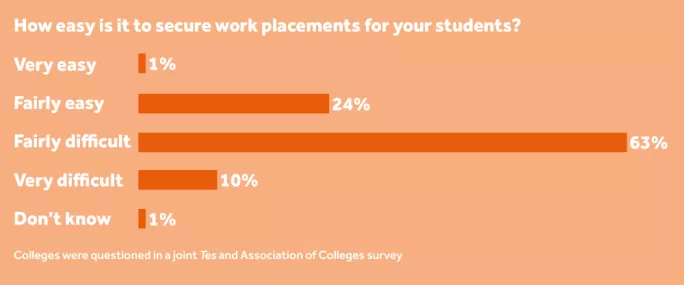The government’s renewed commitment to T levels, as evidenced in the Queen’s Speech on Wednesday, shows that the need for colleges to secure work placements for their students has arguably never been greater.
T levels, which were introduced in the Sainsbury review of technical education last year, were one of two education policy areas to be referred to by Her Majesty. They are expected to be part of a “major reform of technical education” that the government will hope to achieve in the next Parliament.
But a survey by the Association of Colleges, (AoC) in partnership with Tes, reveals that most colleges find it difficult to link their students to the world of work. The survey (see below) shows that almost three-quarters of colleges find it “fairly difficult” or “very difficult” to secure work placements for their students, while just 1 per cent say getting work placements is “very easy”.
The proposed T levels would require every student on each of the programme’s 15 technical routes to undertake a “high-quality industry work placement”. For colleges, this means finding a workplace to take on each of their students.
‘Colleges need to do more to help themselves’
“The main issue is finding appropriate placements and in the numbers required,” says Catherine Sezen, senior policy manager at the AoC. “As we move towards work placements of up to three months, this will be exacerbated by the fact that it is a condition of certification. Time-tabling will also be more challenging for longer placements.”
Sezen says that another reason why some colleges are finding it difficult is because institutions in areas dominated by small- and medium-sized enterprises (SMEs) may not have the same opportunities as colleges in areas with larger employers. Smaller businesses are sometimes reluctant to take on young people for work experience, or even apprentices, because of the extra workload this creates for the small number of staff.
SMEs, defined as businesses with 250 or fewer employees, make up a large proportion of the UK economy. They are particularly common in some industries, such as hairdressing and beauty.
Mike Cherry, national chairman of the Federation of Small Businesses, says small firms do struggle to identify where a young person fits into the business, or how best to structure a work-experience placement. But the majority of small businesses are offering placements to young people, with 70 per cent keen to do so. “While this research suggests that colleges are struggling to secure work placements, we think colleges could do a little more to help themselves,” he says.
“They should look at providing small businesses with good models and templates on how to structure high-quality work experience placements and how best to support a young person at work.”
This is an edited version of an article in the 23 June edition of TES. Subscribers can read the full story here. To subscribe, click here. To download the digital edition, Android users can click here and iOS users can click here. TES magazine is available at all good newsagents.
Want to keep up with the latest education news and opinion? Follow Tes FE News on Twitter, like us on Facebook and follow us on LinkedIn.





